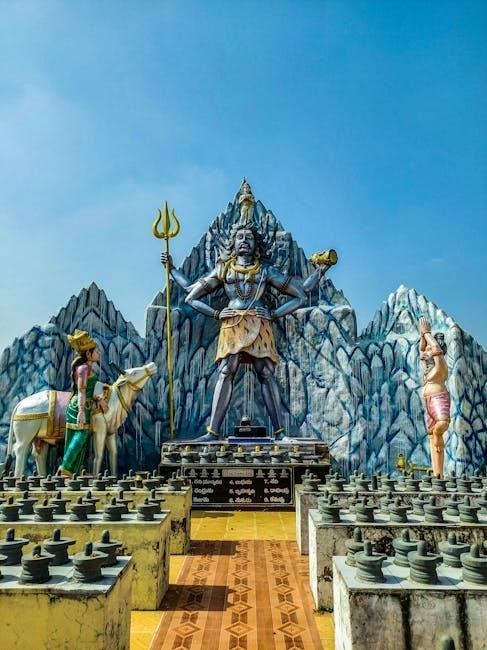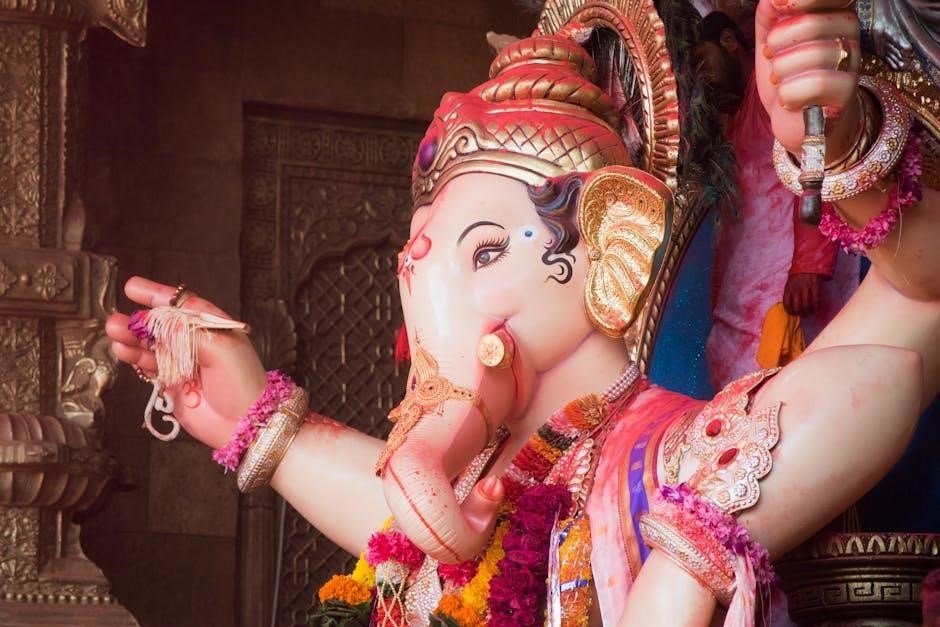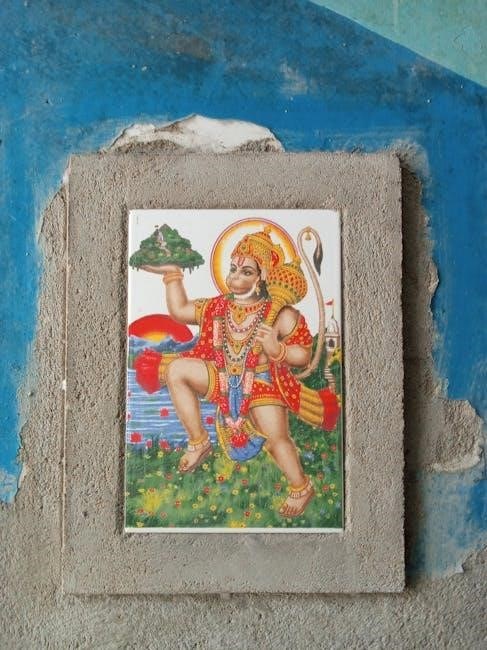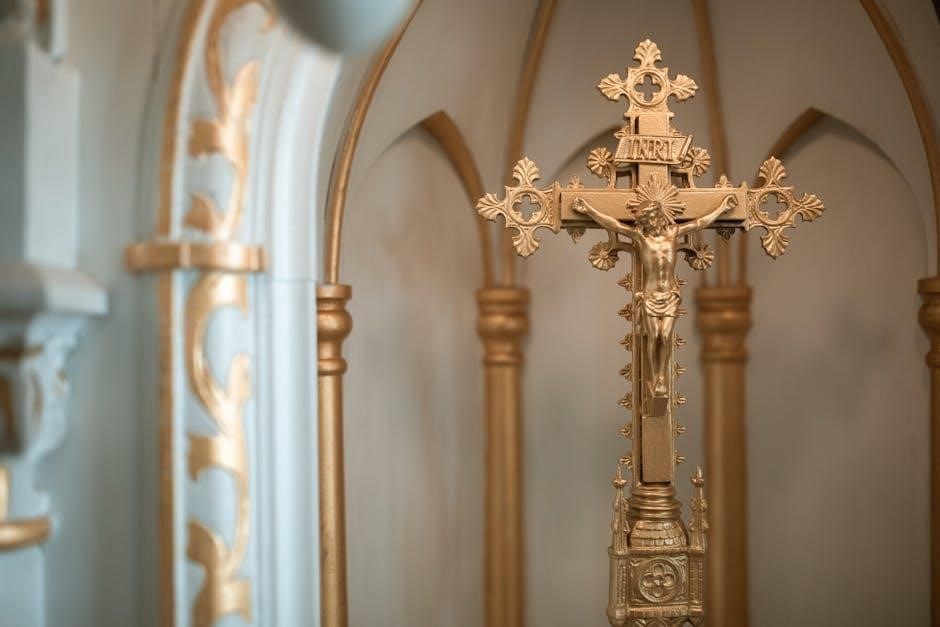William Golding’s 1954 novel explores British boys stranded on an island‚ revealing themes of human nature and society․ Available in PDF‚ EPUB‚ and TXT formats online․
1․1․ Background Information
Lord of the Flies‚ written by William Golding‚ is a Nobel Prize-winning novel published in 1954․ It tells the story of British boys stranded on an island after a plane crash‚ exploring themes of human nature‚ savagery‚ and civilization; The book is widely regarded as a classic in modern literature‚ offering deep psychological insights․ Its digital versions‚ including PDF‚ EPUB‚ and TXT formats‚ are widely available online‚ making it accessible to readers globally․ The novel’s timeless relevance has led to its inclusion in school curricula and literary studies‚ cementing its legacy as a thought-provoking tale of humanity’s duality․ Its enduring popularity continues to inspire adaptations and interpretations․
1․2․ Historical Context
Lord of the Flies‚ published in 1954‚ reflects the post-World War II era’s existential crises and societal upheavals․ William Golding‚ a naval officer during the war‚ drew inspiration from human behavior under stress․ The novel critiques utopian views of humanity‚ offering a darker perspective on civilization․ Its exploration of savagery and power resonated with Cold War anxieties․ The book’s themes of moral decay and leadership struggles mirrored concerns about global stability․ Digital versions‚ including PDF and EPUB formats‚ have made the novel accessible worldwide‚ ensuring its historical and literary significance endures for modern readers․
William Golding‚ a Nobel Prize-winning British novelist‚ explored human nature in Lord of the Flies․ His works‚ like The Inheritors‚ are available in PDF and EPUB formats․
2․1․ Biography of William Golding
William Golding was born on September 19‚ 1911‚ in St․ Columb Minor‚ Cornwall‚ England․ He grew up in a family that valued education and literature‚ which influenced his early interest in writing․ Golding studied natural sciences at Oxford University but later shifted to English literature․ Before becoming a full-time writer‚ he worked as a schoolteacher and served in the Royal Navy during World War II․ His experiences during the war profoundly shaped his worldview and inspired themes of human nature in his works․ Golding’s literary career began with poetry‚ but he gained fame with his debut novel‚ Lord of the Flies‚ in 1954․ He went on to write numerous novels‚ essays‚ and plays‚ earning a Nobel Prize in Literature in 1983․ His writing often explored the complexities of human behavior‚ morality‚ and society․ Golding was knighted in 1988 and passed away on June 19‚ 1993‚ leaving behind a legacy as one of the 20th century’s most influential authors․
2․2․ Major Works by William Golding
William Golding’s literary career is marked by profound works that explore human nature and morality․ His debut novel‚ Lord of the Flies (1954)‚ is his most celebrated work‚ depicting boys stranded on an island․ Other notable novels include The Inheritors (1955)‚ which examines the decline of the Neanderthals‚ and Pincher Martin (1956)‚ a psychological exploration of survival․ Golding also wrote Free Fall (1959) and The Spire (1964)‚ both delving into themes of identity and redemption․ His later works‚ such as The Paper Men (1984) and the unfinished The Double Tongue‚ showcase his continued mastery of storytelling․ His writings earned him the Nobel Prize in Literature in 1983‚ solidifying his legacy as a literary giant․
2․3․ Nobel Prize and Recognition
William Golding was awarded the Nobel Prize in Literature in 1983 for his novels that “illuminate the human condition in the world of today․” His works‚ particularly Lord of the Flies‚ have been widely acclaimed for their deep psychological insights and exploration of human nature․ In 1988‚ he was knighted by Queen Elizabeth II‚ further cementing his literary legacy․ Golding’s writing continues to be studied globally‚ with Lord of the Flies remaining a cornerstone of high school and university curricula‚ reflecting its enduring relevance and impact on modern literature․

Plot Summary of “Lord of the Flies”
A plane crash strands British schoolboys on a remote island․ Initially excited‚ they soon descend into fear and savagery‚ exploring human nature and civilization’s collapse․
3․1․ Chapter 1: The Sound of the Shell
Chapter 1 introduces a group of British boys stranded on a deserted island after a plane crash․ Ralph‚ a fair-haired boy‚ discovers a conch shell‚ which becomes a symbol of order and democracy․ He blows it to gather the other survivors‚ including Piggy‚ a wise but vulnerable boy․ The chapter establishes the island’s setting and the boys’ initial optimism․ Ralph is elected leader‚ and the group discusses building shelters and starting a fire․ The conch shell’s significance is revealed as a tool for maintaining civility and decision-making․ The chapter sets the stage for the exploration of human nature and societal structures․
3․2․ Chapter 2: Fire on the Mountain
In Chapter 2‚ Ralph and the boys focus on building a fire to signal for rescue‚ using Piggy’s glasses to ignite the flames․ The fire becomes a symbol of hope and unity‚ but chaos erupts when Jack’s choir is tasked with maintaining it․ Meanwhile‚ a pig caught in the fire dies‚ symbolizing the boys’ primal instincts․ Ralph struggles to maintain order‚ while Jack’s desire for power grows․ The chapter highlights the tension between civilization and savagery‚ as the boys’ behavior becomes more erratic․ The fire’s significance evolves‚ representing both survival and the loss of innocence․ PDF versions of this chapter are widely available online․
3․3․ Chapter 3: Huts on the Beach
Chapter 3 focuses on the boys’ efforts to build shelters‚ with Ralph emphasizing the importance of huts for protection․ The group’s enthusiasm fades as the task becomes laborious‚ and their focus shifts to playing and enjoying the island․ Jack and his hunters grow more obsessed with killing pigs‚ while Ralph struggles to maintain order․ The chapter highlights the boys’ growing primal instincts and their diminishing concern for rescue․ The huts symbolize their attempt at civilization‚ but the boys’ behavior shows a gradual descent into savagery․ PDF versions of this chapter are available online for further reading and analysis․

Key Themes in “Lord of the Flies”
The novel explores themes of innocence‚ survival‚ and community‚ highlighting the psychological struggle between individual desire and collective good‚ set against the backdrop of primal instincts․
4․1․ Human Nature and Savagery
The novel explores the inherent darkness in human nature‚ as civilized boys descend into chaos․ Their primal instincts emerge‚ revealing a capacity for violence and dominance․ The conch shell‚ a symbol of order‚ gradually loses its power‚ mirroring the erosion of civility․ Jack’s obsession with hunting and Ralph’s struggle for control highlight the internal conflict between savagery and morality․ The “beast” serves as a metaphor for their collective fears‚ symbolizing the unknown and their own capacity for evil․ Golding suggests that without societal constraints‚ humanity reverts to primal behavior‚ emphasizing the thin line between civilization and barbarism․
4․2․ Civilization vs․ Barbarism
The novel vividly portrays the conflict between civilization and barbarism through the boys’ behavior․ Initially‚ they attempt to create order with rules and a conch shell‚ symbolizing democracy and civility․ However‚ as fear and primal instincts take over‚ their civilized facade crumbles․ The island becomes a microcosm of society‚ revealing how quickly humanity can revert to barbarism without structure․ The boys’ descent into chaos is marked by their obsession with hunting and the emergence of tribal behavior․ Golding illustrates that civilization is a fragile construct‚ easily overpowered by primal desires‚ highlighting the delicate balance between order and savagery in human nature․
4․3․ Fear and Its Impact
Fear is a pervasive theme in “Lord of the Flies‚” driving the boys’ actions and unraveling their fragile society․ The mysterious “beast” becomes a symbol of their collective terror‚ sparking paranoia and division․ Initially‚ fear unites them‚ but it eventually leads to chaos as they abandon reason for superstition․ The conch shell‚ once a symbol of order‚ loses its power as fear overtakes their sense of civility․ Fear of the unknown and of each other accelerates their descent into savagery‚ highlighting how primal instincts can dominate human behavior when unchecked․ This fear also accelerates the loss of innocence and the collapse of their makeshift utopia․
4․4․ Power and Leadership
Leadership dynamics in “Lord of the Flies” reveal the complexities of power and its impact on human behavior․ Ralph‚ the democratically chosen leader‚ emphasizes order and civility‚ while Jack’s desire for control and dominance gradually erodes the group’s unity․ The conch shell‚ a symbol of democratic rule‚ loses its authority as fear and savagery take hold․ Golding illustrates how the pursuit of power corrupts‚ as Jack’s authoritarian rule supersedes Ralph’s ideals․ This struggle reflects the universal human conflict between cooperation and domination‚ highlighting the fragility of leadership in the absence of societal constraints․
4․5․ Morality and Ethics
Morality and ethics in “Lord of the Flies” are central themes‚ explored through the boys’ gradual descent into savagery․ Initially‚ their sense of right and wrong is shaped by societal norms‚ but isolation erodes these moral frameworks․ The novel examines how ethical behavior is challenged when consequences are absent․ Characters like Simon and Piggy embody moral clarity‚ while others abandon principles for power․ Golding questions whether humanity is inherently moral or if ethics depend on external structures․ The boys’ actions reveal the tension between innate goodness and learned virtue‚ raising profound questions about human nature and societal influence․

Main Characters
The novel focuses on Ralph‚ Jack‚ Piggy‚ and Simon‚ each representing distinct aspects of human nature․ Ralph embodies democracy‚ Jack pursues power‚ Piggy symbolizes intellect‚ and Simon seeks truth․
5․1․ Ralph: The Democratic Leader
Ralph‚ the protagonist‚ embodies democracy and civility․ Elected leader‚ he advocates for order‚ rescue‚ and collective well-being․ His leadership is symbolized by the conch shell‚ representing fairness and equality․ Ralph’s rationality contrasts with Jack’s authoritarianism․ Throughout the novel‚ Ralph struggles to maintain his moral principles amidst the group’s descent into savagery․ His character highlights the tension between civilization and primal instincts‚ making him a pivotal figure in exploring Golding’s themes of human nature and governance․
5․2․ Jack Merridew: The Hunter
Jack Merridew begins as the leader of a choir but evolves into a ruthless hunter obsessed with killing pigs․ His desire for power and control clashes with Ralph’s democratic ideals․ Jack’s tattoos‚ warrior-like appearance‚ and authoritarian leadership symbolize his embrace of savagery․ He forms his own tribe‚ luring followers with promises of meat and freedom․ Jack’s fear of the “beast” and his relentless pursuit of power drive the group’s descent into chaos․ His character represents the primal instincts that overshadow civility‚ making him a central figure in the novel’s exploration of human nature and barbarism;
5․3․ Piggy: The Voice of Reason
Piggy‚ the intelligent and rational member of the group‚ represents the voice of reason and civility․ Despite his physical limitations and asthma‚ he consistently advocates for logical thinking and order․ Piggy’s reliance on the conch shell as a symbol of democracy highlights his belief in structured governance․ His glasses‚ which start fires‚ symbolize both knowledge and the fragility of civilization․ Piggy’s tragic demise serves as a turning point‚ marking the end of rationality and the complete descent into savagery․ His character underscores the importance of intellect and morality in maintaining societal norms and order․
5․4․ Simon: The Truth-Seeker
Simon‚ a quiet and introspective boy‚ serves as the moral compass of the group․ His solitude often leads to profound insights‚ such as discovering the true nature of the “beast․” Simon’s encounter with the pig’s head‚ a symbol of evil‚ reveals his understanding of humanity’s darker side․ His tragic death‚ mistaken as the beast‚ signifies the loss of innocence and truth․ Simon’s character embodies kindness‚ intuition‚ and the pursuit of understanding‚ making his demise a pivotal moment in the novel’s exploration of human nature and the collapse of civility․

Symbolism in “Lord of the Flies”
The conch shell‚ beast‚ and island symbolize order‚ fear‚ and isolation‚ respectively‚ reflecting humanity’s struggle between civility and savagery in a primal setting․
6․1․ The Conch Shell
The conch shell is a powerful symbol in Lord of the Flies‚ representing order‚ democracy‚ and civilization․ Found by Ralph‚ it is used to summon meetings and ensure everyone’s voice is heard․ The shell’s significance diminishes as the boys’ behavior becomes more savage‚ reflecting the erosion of their civilized instincts․ Its destruction symbolizes the collapse of their societal structure and the rise of chaos․ The conch shell serves as a reminder of the fragile nature of human morality and the ease with which it can be lost without external guidance or authority․
6․2․ The Beast
The “Beast” is a central symbol in Lord of the Flies‚ representing the primal fears and unknown terrors of the boys․ Initially believed to be a physical creature‚ it evolves into a metaphor for their inner savagery․ The Beast sparks paranoia and division among the group‚ leading to irrational decisions and fear-driven actions․ Eventually‚ it is revealed that the Beast is a dead pilot‚ symbolizing the true horror of war and human nature․ This concept underscores Golding’s exploration of how fear can lead to the breakdown of civilization and the rise of primal instincts․
6․3․ The Island
The island serves as both a setting and a symbol in Lord of the Flies‚ representing isolation and the boys’ detachment from civilization․ Initially a paradise‚ it becomes a place of conflict and savagery․ The island’s transformation mirrors the boys’ descent into chaos‚ with its once-pristine environment deteriorating alongside their moral values․ It symbolizes humanity’s inherent capacity for destruction when left unchecked․ The island’s isolation forces the boys to confront their true nature‚ highlighting Golding’s theme of human frailty and the effects of power without accountability․

Digital Versions of “Lord of the Flies”
Lord of the Flies is available in various digital formats‚ including PDF‚ EPUB‚ and TXT․ These versions can be downloaded from online platforms like LitRes or read free․
7․1․ PDF Formats Available Online
PDF versions of Lord of the Flies are widely available for download‚ offering a convenient reading experience․ Platforms like LitRes‚ Google Books‚ and Project Gutenberg provide access to high-quality PDF files․ Some versions‚ such as the 1․9 MB file‚ ensure readability on various devices․ Readers can choose between free and paid options‚ depending on the source․ Additionally‚ PDFs often include original formatting‚ preserving the novel’s intended structure․ This format is ideal for academic purposes or for those who prefer digital books; Many websites also offer PDFs with annotations or study guides‚ enhancing the reading experience for students and enthusiasts alike․
7․2․ EPUB and TXT Versions
EPUB and TXT versions of Lord of the Flies are widely accessible online‚ catering to diverse reading preferences․ EPUB files‚ such as the 2․5 MB version‚ offer flexible formatting for e-readers and mobile devices․ TXT files‚ like the 366 KB version‚ provide a lightweight option for easy readability across platforms․ Platforms like LitRes and online archives offer these formats for download‚ ensuring accessibility for readers worldwide․ Both EPUB and TXT versions maintain the novel’s original content‚ making them ideal for academic use or casual reading․ Their compatibility with various devices enhances the reading experience‚ making the story reachable to a broader audience․
7․3․ Free Download Options
Free downloads of Lord of the Flies are available in PDF‚ EPUB‚ and TXT formats from various online sources․ Websites offer direct links to these files‚ enabling readers to access the novel without cost․ PDF versions‚ such as the 1․9 MB file‚ are popular for their clear formatting and readability․ EPUB and TXT versions provide flexibility across devices․ Platforms like LitRes and online archives ensure these files are easily downloadable‚ making the novel accessible to a global audience․ These free options are ideal for students and enthusiasts seeking to explore Golding’s timeless work without financial barriers․
Critical Reception
Critical reception of “Lord of the Flies” highlights its deep exploration of human nature‚ society‚ and morality‚ with both acclaim and controversy surrounding its themes․
8․1․ Initial Reviews and Controversies
Upon its release in 1954‚ Lord of the Flies sparked intense debate due to its grim portrayal of human nature․ Critics praised its psychological depth‚ while others found its themes of savagery and moral decay unsettling․ The novel’s controversial exploration of civilization’s collapse resonated with post-war audiences‚ though some deemed it too bleak․ Despite this‚ it quickly gained recognition for its bold narrative and thought-provoking ideas․ The book’s ability to challenge societal norms contributed to its notoriety‚ solidifying its place as a provocative and enduring work of literature․
8․2․ Modern Interpretations
Modern interpretations of Lord of the Flies highlight its timeless relevance‚ with scholars analyzing its psychological insights and societal critiques․ The novel is often studied in schools‚ sparking discussions on human nature‚ morality‚ and leadership․ Digital formats like PDF and EPUB have made it accessible to new generations‚ ensuring its enduring popularity․ Readers continue to draw parallels between the novel’s themes and contemporary issues‚ such as group behavior‚ power dynamics‚ and the effects of isolation․ Its universal appeal lies in its ability to provoke reflection on humanity’s dual capacity for good and evil․

Psychological Analysis
Exploring human nature‚ the novel delves into inherent savagery‚ fear‚ and power dynamics‚ revealing how isolation strips away civilization‚ exposing primal instincts and psychological decay․
9․1․ Freudian Perspectives
Freudian analysis of Lord of the Flies explores the struggle between the id‚ ego‚ and superego․ Ralph represents the ego‚ striving for order‚ while Jack embodies the id‚ driven by primal impulses․ Piggy‚ as the voice of reason‚ symbolizes the superego‚ advocating for morality․ The island serves as a symbolic playground for these psychological forces‚ revealing how civilization thinly veils innate savagery․ Freudian theory aligns with Golding’s depiction of human nature’s darker aspects‚ as the boys’ behavior regresses without societal constraints․ This perspective underscores the novel’s timeless relevance in understanding human psychology․ PDF versions of the book facilitate deeper analysis of these themes․
9․2․ Behavioral Studies
Behavioral studies of Lord of the Flies examine how isolation and power dynamics shape human conduct․ The novel illustrates group behavior‚ leadership‚ and decision-making under stress․ Ralph’s democratic approach contrasts with Jack’s authoritarianism‚ highlighting divergent behavioral responses to authority․ The conch shell‚ as a symbol of order‚ reflects the boys’ initial adherence to societal norms․ As the novel progresses‚ their behavior devolves‚ revealing primal instincts and the collapse of civility․ These observations align with behavioral theories on group dynamics‚ leadership‚ and the effects of isolation․ PDF versions of the book provide accessible resources for studying these behavioral patterns in depth․
Educational Significance
Lord of the Flies is widely studied in schools‚ exploring human nature and promoting critical thinking․ Its themes and availability in formats like PDF enhance educational resources․
10․1․ Use in School Curricula
Lord of the Flies is widely incorporated into school curricula due to its exploration of human nature‚ morality‚ and societal structures․ Educators value its ability to provoke critical thinking and discussions on ethics․ The novel’s themes of leadership‚ fear‚ and civilization vs․ barbarism resonate with students‚ making it a cornerstone of literature studies․ Many schools provide study guides‚ PDF resources‚ and online materials to aid comprehension․ Its inclusion in curricula helps students develop analytical skills and understand complex psychological dynamics‚ fostering deeper engagement with literary works․
10․2․ Study Guides and Resources
Study guides and resources for Lord of the Flies are abundant‚ offering in-depth analyses‚ summaries‚ and discussion questions․ PDF versions of the novel and companion guides are widely available online‚ providing students with accessible materials․ These resources often include character analyses‚ theme explorations‚ and historical context to enhance understanding․ Many educational platforms offer downloadable study packs‚ while websites like LitRes provide e-books in formats such as EPUB and TXT․ These tools are invaluable for students and educators‚ fostering a deeper engagement with Golding’s work and its complex themes․
Adaptations and Interpretations
Lord of the Flies has been adapted into films‚ stage plays‚ and even an audio version narrated by William Golding‚ offering diverse interpretations of the novel․
11․1․ Film Adaptations
The novel has been adapted into films‚ with the 1990 version directed by Harry Hook being the most notable․ This adaptation stays faithful to the original story‚ capturing the descent into chaos․ Another version‚ directed by Peter Brook in 1963‚ offers a more minimalist interpretation․ Both films highlight the themes of human nature and savagery‚ resonating with audiences․ These adaptations have been well-received and remain popular among fans of the book․ They provide a visual exploration of Golding’s timeless themes‚ making the story accessible to new generations․ The films are widely available in various formats for viewers to appreciate․
11․2․ Stage Plays
Lord of the Flies has been adapted into stage plays‚ bringing the island and its characters to life in a theatrical setting․ These adaptations often use minimalistic sets and focus on dialogue to convey the novel’s themes․ The plays highlight the tension between civilization and savagery‚ resonating with audiences globally․ Adaptations have been performed in numerous theaters‚ showcasing the timeless relevance of Golding’s work․ The stage versions remain faithful to the original narrative while offering a unique interpretation of the story’s moral and psychological depth․ They continue to captivate audiences‚ making the novel’s themes accessible in a live format․ The plays are a testament to the enduring appeal of Golding’s vision․
Legacy of the Novel
Lord of the Flies has left a profound impact on literature‚ influencing countless works and remaining a cornerstone of educational curricula worldwide․ Its exploration of human nature continues to resonate deeply with readers‚ cementing its place as a classic of 20th-century literature․ The novel’s themes of savagery‚ power‚ and morality are timeless‚ ensuring its relevance across generations․ Its influence extends beyond literature‚ shaping psychological studies and cultural discussions․ The availability of PDF and digital versions has further expanded its reach‚ making it accessible to a global audience․ Golding’s masterpiece remains a vital part of modern intellectual discourse․
12․1․ Cultural Impact
Lord of the Flies has become a cultural phenomenon‚ shaping discussions on human nature and societal structures․ Its themes resonate across literature‚ film‚ and psychology‚ inspiring adaptations and interpretations․ The novel’s exploration of savagery and civilization has influenced modern thought‚ making it a cornerstone of educational systems worldwide․ Digital versions‚ including PDFs‚ have broadened its accessibility‚ ensuring its ideas reach a global audience․ Golding’s work continues to provoke reflection on morality‚ leadership‚ and fear‚ solidifying its enduring relevance in contemporary culture․ Its impact is evident in its adaptation into films‚ stage plays‚ and scholarly analyses‚ further cementing its legacy․
12․2․ Influence on Literature
Lord of the Flies has profoundly influenced modern literature‚ inspiring authors to explore themes of human nature‚ morality‚ and societal collapse․ Its psychological depth and narrative techniques have shaped dystopian and young adult genres․ The novel’s examination of civilization versus savagery has prompted writers to reflect on similar dilemmas․ Digital formats‚ like PDFs‚ have made the book widely accessible‚ fostering its study and adaptation․ Golding’s work remains a benchmark for literary analysis‚ encouraging writers to delve into complex moral and ethical questions․ Its influence is evident in contemporary literature‚ where themes of survival and leadership continue to resonate․

